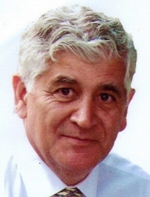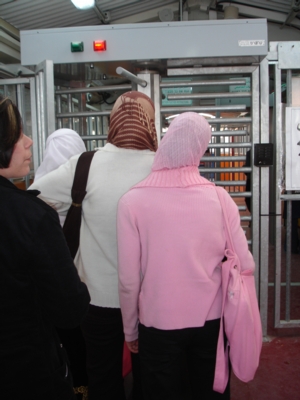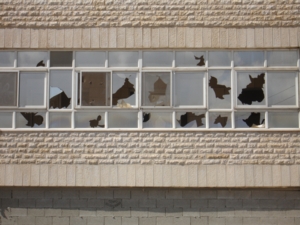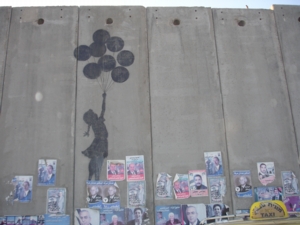Lost in the white summer heat of Friendship Heights, and diabolically misdirected, I see a car pull up to the curb. Mubarak Awad waves me in. I had managed to misread his impeccable directions to his Nonviolence International headquarters in Washington, DC. Serial instructions panic me. Had I been a Palestinian farmer during Awad’s olive tree actions in the late-eighties, before his expulsion from Israel in 1988, I am sure I would have been the only one to get wrong his simple set of Gandhian instructions: no attacking the soldiers, no cursing the soldiers, no running away, no resisting arrest.
 |
|---|
Mubarak Awad |
Awad, at age fifty-five, has a strong kind face, and a shock of white hair. We both have white hair. When I interviewed him in New York in 1987, a year before his expulsion, his hair was black. Mine too. Well, blackish. Black subverted by outcroppings of gray. He doesn’t remember me. How did it first begin? I ask him. His campaign to bring Gandhian resistance to the Palestinians?
We are sitting at a small table by a large window that looks out on the campus of the American University. He is given office space in the home of an elderly ex- professor, a friend of Nelson Mandela. He recalls his first nonviolent action, a talk at the Y in Jerusalem, in 1982. He had just returned from Bluffton College in Ohio, a Mennonite college (Awad is a Mennonite), with a Masters in Psychology, on fire with the teachings of King and Gandhi.
“I put an ad in the papers for a talk I planned to give on the psychological implications of occupation. I told them at the Y that I needed a small room for ten or fifteen people.”
Hundreds of people were milling about when he showed up. He thought they were there for a wedding. He laughs at himself in his easy ironic way. I remember that laugh. It was the way he laughed before being yanked from the stage of history. I admire its autonomy.
 “The first thing I said was: ‘We are under occupation because we choose to be under occupation. If we don’t want to be occupied, let’s do what Gandhi did, let’s do what Martin Luther King did.’”
“The first thing I said was: ‘We are under occupation because we choose to be under occupation. If we don’t want to be occupied, let’s do what Gandhi did, let’s do what Martin Luther King did.’”
The next day there were Israeli soldiers at the Y to make sure there were no more lectures. Arafat and the PLO were equally displeased.
“They were asking, ‘Who is this guy? Is he CIA? Is he Mossad? I thought, my God, what a headache I created for myself!”
Long before Bil’in and Palestinian-Israeli joint actions against the occupation, Awad enlisted the assistance of Israelis in his olive tree resistance. When soldiers would come to uproot the olive trees so as to clear the land for settlements, they would find Israeli activists side by side with Palestinians, planting new trees as soon as the old ones were uprooted.
“Palestinians would say, ‘Why do you invite the devil to be beside you?’ I told them, ‘There may be devils in Israel, but there are also saints. Every society has both.’ I remember there was a rabbi who worked with us. Every year, he had a new kid on his shoulder. I told him he was worse then the Palestinians.”
By challenging the sanctity of the armed struggle against Israel so publicly he was one of those responsible for steering the first intifada in a nonviolent direction. He floats another reason for the unexpected course it took.
“The PLO leadership was in Tunis. New leadership was being developed on the ground with its own ideas. They were open to trying a new way. Marwan Barghouti (the PLO leader now serving a life sentence in Israel on terrorist charges) was with me for a time during the First Intifada. I thought, my god, if I could convince one like him to accept nonviolence, that would be great. I wanted Muslims to take a leadership role in the nonviolent struggle.”
 He ticks off the achievements of the intifada: “The Israeli mentality changed, the American mentality changed. They began to feel, you can talk to the Palestinians, you can deal with the Palestinians. Also, Arafat began accepting that you have to talk to the Israelis. And on the ground, young people began coming together on their own, ignoring the PLO, considering for themselves the concept that Palestine belonged to them, not to the PLO. Unfortunately, the intifada was killed by the PLO. They became very jealous of losing their leadership role, and they destroyed that leadership by having the leaders of the intifada replaced by their by their own leaders.”
He ticks off the achievements of the intifada: “The Israeli mentality changed, the American mentality changed. They began to feel, you can talk to the Palestinians, you can deal with the Palestinians. Also, Arafat began accepting that you have to talk to the Israelis. And on the ground, young people began coming together on their own, ignoring the PLO, considering for themselves the concept that Palestine belonged to them, not to the PLO. Unfortunately, the intifada was killed by the PLO. They became very jealous of losing their leadership role, and they destroyed that leadership by having the leaders of the intifada replaced by their by their own leaders.”
He attributes to the Second Intifada to the failure of the first. The occupation grew stronger, not weaker. The settlements increased rather than decreased. The lives of Palestinians grew harder rather than easier, more perilous and more confined rather than safer and freer. They chose to reject the authors of the First Intifada’s failure.
I have downloaded the mission statement of Nonviolence International. The organization offers itself as a hand extended to nonviolent activists everywhere, including tsunami-bashed Acheh. It maintains that nonviolence is compatible with all religions, and can be awakened in all religions. A worthy organization, but tame. I think of the man who invited himself on to Israeli military bases to dialogue with soldiers, who flung his imperiled self into public debates with Kahane, who plunked himself down in the middle of West Bank villages with his posters of Gandhi, “that skinny Gandhi who liberated India from the British.”
 The part of me that gets caught up in his drama finds it a little sad. The fearless man who no longer has anything to fear. Maybe I take heroic narratives too seriously.
The part of me that gets caught up in his drama finds it a little sad. The fearless man who no longer has anything to fear. Maybe I take heroic narratives too seriously.
Awad himself seems perfectly content to operate beyond the scrim of intifadas. He teaches a course on nonviolence at the American University, works with troubled adolescents in the Midwest, meets with Palestinian nonviolent activists wherever he finds them.
“We get together at international conferences, or when they come here. I am always emailing them.”
He recalls for me the sparring with the Israeli court that expelled him. It was like hearing an account of a famous political divorce case. The proceedings won for Awad publicity that far exceeded the attention given to the spectacular ceremonies of bloodletting carried out by Palestinian extremists.
The case received international attention. The Reagan White House supported Awad. Secretary of State George Schultz personally pleaded with Prime Minister Shamir on his behalf, warning him that expelling the nonviolent activist would damage Israel’s image in the US. The New York Times covered the story closely. On June 7, 1988, the day after Awad’s expulsion order was upheld by the Israeli Supreme Court, the Times ran an editorial entitled: ISRAEL NEEDS AWADS NOT ARAFATS. It began with the following words:
For moral and practical reasons, it is regrettable that Israel’s High Court of Justice could find no reason to overrule the deportation of Mubarak Awad, a Jerusalem- born American citizen. The ruling suggests that Israel, made frustrated by the uprising in the occupied West Bank and Gaza, is having trouble drawing the line between civil disobedience and armed rebellion.
Awad put his sly, absurdist stamp on the trial, announcing that were he to be expelled from Israel he would convert to Judaism and return under the Law of Return. Part of him had a heart connection to Abbie Hoffman, and the philosophy that if the enemy could not be defeated, he must at least be driven crazy.
 “Why did they actually expel you?” I ask him. “I know the pretext was that your visa had expired.”
“Why did they actually expel you?” I ask him. “I know the pretext was that your visa had expired.”
“They were afraid I will have a lot of followers. I already had some, but they were starting to grow more. I was telling people to protest, not to buy Israeli goods, not to pay Israeli taxes. I was instructing the kids to put sugar and salt in the gas tanks of Israeli military trucks.”
Over Awad’s shoulder, the world is green and calm. No one is disputing who are the rightful owners of the grass. Where does Palestinian nonviolence stand these days, I want to know, given the rise of Hamas, and all the blood the second intifada has dumped on both doorsteps? “Nonviolence always works,” he says, for he is a man of faith. “The government and the military will try to tell you that you have to kill for your country, your flag, God. But education can change that. Who is talking to Hamas? No one. During the first intifada, we talked to those on top, those in the middle, those at the bottom. The same thing has to be done now.” I click off my tape recorder. I carry his strong voice to the door.








Oh my goodness! an incredible article dude. Thanks Nonetheless I am experiencing concern with ur rss . Don’t know why Unable to subscribe to it. Is there anybody getting equivalent rss drawback? Anyone who knows kindly respond. Thnkx
I am usually to blogging and that i truly appreciate your articles. The article has really peaks my interest. I am going to bookmark your web site and maintain checking for first time information.
After study a few of the websites on your own site now, i really such as your method of blogging. I bookmarked it to my bookmark website list and will be checking back soon. Pls have a look at my web site as well and figure out what you consider.
A lot of thanks for your whole efforts on this web site. Kate really loves doing investigations and it’s easy to understand why. My spouse and i hear all of the powerful means you give useful strategies via your web site and even improve response from visitors on the idea while our girl is becoming educated a lot of things. Take advantage of the remaining portion of the new year. You’re the one conducting a useful job.
When I originally commented I clicked the -Notify me when new surveys are added- checkbox and today every time a comment is added I purchase four emails with similar comment. Perhaps there is however you possibly can get rid of me from that service? Thanks!
Thanks a lot for giving everyone an extraordinarily brilliant chance to read articles and blog posts from this blog.
I never usually post on blogs but I have found this is very useful work.